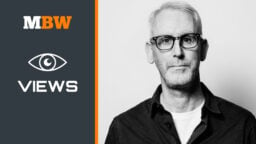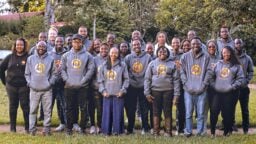Mathew Knowles, has had, to put it lightly, a momentous career in music.
Across the course of nearly 30 years, he’s played a key role as manager in the launch and development of Destiny’s Child, his daughter Beyonce Knowles’ subsequent world-beating solo career, and that of her sister, Solange, too.
On top of that, he’s been involved in the careers of acts including Earth, Wind & Fire and Chaka Khan via his Music World label and management company, serving as executive producer on albums that have reached over 450m sales worldwide.
Most recently, he’s joined the board of African-based streaming company, MePlaylist, where he’s now President of Global Marketing and Communications, tasked with delivering all global marketing and communication initiatives.
Knowles helps leads the company from the US alongside Lagos-based founder Olakunle Oladehin and Michael Kay Kiladejo, who is President of Global Licensing and Content Acquisition.
Speaking about his ambitions for the platform — which recently struck distribution deals with FUGA and Symphonic, adding some 7m songs to its catalog — Kiladejo says the goal is for MePlaylist to become a globally recognised brand in the streaming space.

He explains: “For an emerging market like Africa, you have to take a bespoke approach to the business of streaming. If you look at the more established streaming platforms as they exist today — Spotify aren’t in Nigeria, for example, and the Apple iPhone isn’t prevalent in Africa at all because it’s considered too expensive.
“As a result, and also due to the fact that digital has been slower to take off there when compared to the rest of the world, you’re looking at virgin territory. What that means for a company like MePlaylist is that as well as being international, we are also very localised.
“We can reach parts that aren’t being reached at the moment by more established streaming companies and play the natural role in lifting the various different music forms in Africa and exhibiting them on a platform. There is definitely room for an international streaming company with a very localised outlook, and that’s who we are.”
Alongside his work with MePlaylist, Knowles still manages Destiny’s Child, which currently includes working on an upcoming musical and documentary, writing books (of which he’s published five), public speaking, film and TV projects, and teaching at Texas Southern University. His role with Beyoncé and Solange is now strictly as a father only.
Here, we chat to him about MePlaylist, what it takes to launch a global superstar, how he feels about his daughters’ success, and why he thinks there’s a lack of education in the music business.
What inspired you enough about MePlaylist to get involved in the platform?
First and foremost, knowing the opportunity that exists in Africa, which has 54 countries, for growth in the streaming space. In America, we’ve pretty much had the growth that we can already, so the industry is always looking at the emerging markets.
The second thing was the opportunity that came my way through a young man, Michael Kay, who I was working with already for other projects. It was another way to expand my relationship with Michael but also to do business with two young men of African descent. As an African American, that was important to me. When we look at digital streaming platforms, you don’t see many [leaders] that look like us.
“as an african american, It’s important for me to do business with two young men of African descent. When we look at digital streaming platforms, you don’t see many [leaders] that look like us.”
Olakunle, the founder of MePlaylist, had put together a robust technical back-end for this project, and he has a great team in Lagos. Having the right technical support is very important for a streaming service. So it’s elements of those three things that made this project important to me.
What are your ultimate ambitions for the platform? Where would you like to see it in five to ten years’ time?
Well, in ten years’ time, I hope we’ve sold it by then! Right now, we are going through a growth pattern. We’ve just announced seven million songs that we will begin to put on the platform but we have to be very careful here. We have demand from major music companies that want to put their music on our platform, but we have to make sure we scale correctly, not grow too fast, and cover our bases on the technical aspect.
As any start-up company, we have to crawl first and make sure we have our systems and the correct team in place, and that our marketing is correct. We have an opportunity to bring hundreds of millions of songs to the platform and we hopefully will by this time next year.
Combined, we have 50+ years of experience. I’ve done this now for 27 years, had multiple companies, sold them, bought them, and marketing is my expertise. We have the right team with me, Michael and Olakunle at the top, bringing all three of our expertise together.
You spoke earlier about how the African music market is one of the key emerging markets that the wider global music industry is looking to for development. How do you see that market growing over the coming years?
I think it’s a market that, every year, has the potential to double [in size]. The growth of the mobile phone in Africa becomes a very important part of this, as well. I’ve been to Africa on a number of occasions and seen young people with two, sometimes three, mobile phones.
“Africa is a market that, every year, has the potential to double [in size].”
We are also beginning to see the improvement of technology like 5G, which impacts our business tremendously. It used to be that if you wanted to send a simple three-minute video, it might take 12 hours to get there, and that was two years ago.
Speaking with your management hat on, how do you approach artist development? What are your key principles when working with talent?
First of all, if you want to know my approach to artist development, read some of my books or take one of my courses that I’m teaching online. But the key to artist development for me… I’ve had many artists that come to me and they want to play their instruments or they want to sing or rap, but that is not the key element.
For me, it’s to understand how passionate they are — is this truly their passion or are they trying to be famous? Is it for money? If they are passionate, then what co-exists with that is work ethic, so you have an artist that’s going to work extremely hard. If it’s a hobby, you are not going to get that.
So it’s about identifying that and making sure that you understand the vision. I’ve said no many more times than I’ve said yes — way before I’ve heard someone sing, rap, or play an instrument.
Artist development is about understanding many aspects — the technical aspect, understanding the stage, how to use the microphone correctly, monitors, what everyone does, where the front of the house is, how to communicate during a performance with the sound house person… I’m just touching the surface here.
Being a singer and rapper is one thing, being an entertainer is another. For those of us that do it at a very high level, and I emphasise high level — a Destiny’s Child, a Beyoncé, an Earth, Wind & Fire, Chaka Khan, who I’ve had on my label and worked with — that kind of level, it’s a different process that we have. We practice failure — Destiny’s Child would practice, at any given time, the lights are going to go off, the sound is going to go off, their shoe heel might break. We practised that without them knowing when [it might happen].
Aside from talent and, to a larger extent, hard work, what else does it take to launch a global superstar like Beyoncé?
Well, it also starts with imaging. We are in an imaging business and we’ve watched some people change and work on their image, so that becomes very important, especially for a woman. I don’t make the rules but I do know what they are.
Then there’s other aspects — a great song. You can be Beyoncé all day long and have a whack song and it probably equals whack. A great song is where it all starts. I’m giving away a whole bunch of gems here today — I hope people understand that I don’t normally do this!
How do you feel about the success that both Beyoncé and Solange have achieved across their careers, and the position they both hold in global culture today?
When I look at Beyoncé and Solange, I’m extremely proud because they have taken the knowledge that they were given, and they’ve taken the structure that they were given, and they’ve now taken that to a new height.
I’m proud of Solange, who had to pave her own way and not be in the shadow of her sister, who is the largest female artist, maybe the largest artist, in the world. But she paved her own way and that’s very difficult to do.
Beyoncé is on another zone, she’s just accomplished so much all of her careers, in Destiny’s Child and as Beyoncé the solo artist — that might not be done again for a long time.
To have the most Grammys of any female artist in the history of music, Solange a Grammy-winner who writes incredible songs, for the first time ever in the history of music, two sisters having No.1 albums at the same time. When I say high level, this is what I mean. I’m not talking about selling a million records or having streams that are equivalent album sales of a million, I’m talking about sales in the hundreds of millions and selling out stadiums.
Was it difficult for you to relinquish your role as Beyoncé’s manager?
The media tried to paint a picture to sell advertising, and I understand that, but most of it’s untrue. When I was a young man, and I would ask you the same question, do you want to be around your parents when you are 35-years-old and they are still in your business every day? I think your answer would be, ‘Hell no!’ You want to be out on your own and have your own wings.
“[when i stopped being Beyoncé’s manager,] The media tried to paint a picture to sell advertising but most of it’s untrue. If you look at Beyoncé’s team today, I hired 60% of them. That kind of says it all.”
I’m grateful that me and my former wife and friend Tina gave our kids the skillset that they needed, I’m grateful that my team at Music World were the architects of both Solange and Beyoncé’s careers.
Somebody had to design this career from day one, and I was fortunate enough to be that person, along with my team. They both took that and they built an incredible team. If you look at Beyoncé’s team today, I hired 60% of them. That kind of says it all.
Going back to the subject of streaming and the development of services and the wider music industry, streaming is still under constant criticism for the amount of money artists, and songwriters especially, are receiving from it. Where do you stand on that debate?
Well, I think it depends on who’s doing the talking. Are you the record label, the manager, or the artist? I think everybody’s position is different. For me, I just believe in fairness and equity.
For MePlaylist, we allow artists the opportunity to come directly as independent artists, as well as major record labels, to be on the platform. We want to be inclusive of that and we want to have a sense of fairness. But the rate for streaming is set by the industry, it’s not really set by one person — we have to look at our expenses and our profitability and that everyone is different.
Aside from your work with MePlaylist and the Destiny’s Child musical, is there anything else on the horizon that you’re excited about that you’re working on?
My excitement is to focus on MePlaylist and make sure that this is successful and that we are making a positive impact. Next year, we’ve looked to do some things, and there is an educational component.
I want to do masterclasses with MePlaylist so that we can give information and knowledge. Because that’s what’s lacking in the industry — there’s a lot of failure on both sides of the microphone, we are in a 95% to 99% failure rate, which is an amazing failure rate of artists, and a lot of that has to do with knowledge.
So the idea is to educate artists about their career via MePlaylist?
Not just artists, we want to educate on both sides of the microphone — managers, anyone that wants to be on the business side, we want to give them the knowledge. That’s something we will be announcing that will separate us and make us different at MePlaylist, along with interaction that we allow on our platform.
What do you mean by interaction?
The users can interact. I can’t talk much more about that part of it because it’s proprietary but there is something coming soon.
Final question — what would you change about the music industry and why?
I would inform people that don’t know how gospel music, rock music, rap music, and country music came about so that they educate themselves and understand the power of the Africans years ago, when they took their journey on the diaspora and got to America. These music genres came from Africans, who were slaves.
The econtin, banjo, xylophone, flute, and drums were created in Africa. The slaves were doing country music way before white people began to do it, the Zulu Nation created hip hop. I want the industry to know the true facts, not ‘his story’ — history — but the true story.
“people are so quick to take credit [in the music industry] and they are so quick to run away when it fails. We just need to tell the truth about the history of music.”
That’s what I’m doing today, sharing that information, because we have it wrong. We are giving people credit for these genres of music. We say that Elvis Presley was the king of rock and roll, not true, we can go all the way to Fats Domino, Little Richard, and a lot of other people.
We need to educate ourselves on the history of music and give the respect that the African continent deserves. It got taken away from them and everybody else took credit. We see that all the time, just like everybody is taking credit for Destiny’s Child, ‘I was there, I did that’. We do that in the music industry — people are so quick to take credit and they are so quick to run away when it fails. We just need to tell the truth about the history of music.
Music Business Worldwide





